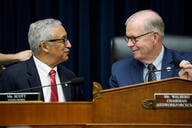You have /5 articles left.
Sign up for a free account or log in.

The Penn State Board of Trustees will vote this week on a plan to close several branch campuses.
Photo illustration by Justin Morrison/Inside Higher Ed | John Greim/LightRocket/Getty Images | adventtr/iStock/Getty Images
As Pennsylvania State University’s Board of Trustees prepares to decide the fate of seven of its 19 Commonwealth Campuses where enrollment has collapsed over a decade, faculty, lawmakers and some board members are questioning the university’s commitment to the state and say administrators haven’t been transparent about their decision-making process.
University administrators say the enrollment numbers alone don’t support keeping open the seven campuses slated to close. Several of those campuses have seen enrollment fall by more than 40 percent since fall 2014.
Penn State’s Board of Trustees met last week in a private executive session but did not vote on the plan. They’re expected to do so Thursday.
President Neeli Bendapudi has made the case for the closures, arguing such actions are necessary, as the university can no longer sustain all of its branch campuses financially amid severe enrollment declines. She proposed closing the Dubois, Fayette, Mont Alto, New Kensington, Shenango, Wilkes-Barre and York campuses. Those campuses enroll almost 3,200 students altogether, the largest of which is Penn State York with 703 students last fall. The smallest is Shenango, which enrolled 309 students in fall 2024.
Now, as the proposal nears the finish line, its fate is up the air and Bendapudi is facing concerns about the process of reaching the seven names.
A ‘Difficult But Necessary’ Plan
University leadership began drawing up those plans in February after a difficult year for higher education across the Keystone State. Four universities in the state shut down (or ended degree programs, as in the case of the Pennsylvania Academy of the Fine Arts) in 2024. The closures were mostly brought on by enrollment challenges, though some were dogged by concerns about fiscal mismanagement.
University administrators spent the last several months reviewing 12 campuses for possible closure before the list of seven leaked to media outlets last week.
Officials in a 143-page document cast the plan as “difficult but necessary decisions to ensure its long-term sustainability, allowing for continued investment in student success and dynamic learning environments for years to come” amid plunging enrollment and broad demographic challenges.
Officials argued that the seven campuses identified for closure “face overlapping challenges, including enrollment and financial decline, low housing occupancy, and significant maintenance backlog.” They added that “projected low enrollments pose challenges for creating the kind of robust on-campus student experience that is consistent with the Penn State brand” and would require significant investments, including $200 million for facilities alone.
“I believe the recommendation balances our need to adapt to the changing needs of Pennsylvania with compassion for those these decisions affect, both within Penn State and across the commonwealth,” Bendapudi said in a statement when the plan was released.
She added that there is a two-year timeline for closing campuses, so they wouldn’t shut down until the end of the spring 2027 semester.
Now the plan heads to the 36-member Board of Trustees. However, some trustees have openly expressed their opposition to the proposal.
Jay Paterno is one of several board members who have pushed back on the plan, writing an op-ed last month with four other trustees that argued Penn State should explore other options.
In an interview with Inside Higher Ed, Paterno criticized the proposal as rushed.
“We’ve been presented with two options. One is the status quo, which everybody knows is not viable and is kind of a straw man. The other option is to close all seven campuses,” he said.
Given that the costs of operating those campuses comprise “less than half of 1 percent of our budget,” Paterno said the board should take more time to explore solutions. He argues that the university has not tried to leverage fundraising to support struggling Commonwealth Campuses and that the administration should slow the process down and reach out to potential donors.
“We’d rather be a year late than a day early,” Paterno said.
He also noted the decision to close campuses is not Penn State’s alone. The university is state-affiliated but not state-owned, which gives it a greater degree of autonomy than fully public institutions. But since the university receives some public funds, it must submit plans to close campuses to the Pennsylvania secretary of education, who must then approve the proposal.
‘A Betrayal’
Faculty have concerns about job losses, what will become of rural student populations and an alleged lack of transparency in the closure process.
One faculty member at Penn State Wilkes-Barre, speaking anonymously due to concerns about retribution, noted, “While most faculty saw this coming, it was heartbreaking to see it in writing.”
They questioned Penn State’s support for its Commonwealth Campuses, arguing that “the decision to decrease funding” to those locations that serve in-state students sends a strong message about where Penn State places its priorities” while it invests heavily in its main campus. They also pointed to renovations at Beaver Stadium projected to cost $700 million.
(That project is believed to be the most expensive renovation in the history of college athletics.)
“The lack of shared governance, transparency, and respect for contributions of faculty to Penn State University makes it easy to see why unionization efforts among faculty are needed,” they wrote, highlighting ongoing efforts by the Penn State Faculty Alliance and SEIU 668 to unionize.
Some state politicians have also panned the plan.
State Senator Michele Brooks, a Republican who represents a district that includes the Shenango campus, told Inside Higher Ed in an emailed statement that she recently met with trustees, who conveyed to her and others “that they feel this has been a deeply flawed process.”
She urged Penn State’s administration and governing board to re-evaluate the decision and to work “with communities on innovative ways to reinvest in these campuses and help them grow.”
Republican state representative Charity Grimm Krupa, who serves a district that includes the Fayette campus slated for closure, accused Penn State of betraying its mission in a fiery statement.
“Shutting down the Fayette campus isn’t about financial responsibility; it’s about walking away from the very students Penn State was created to serve,” Grimm Krupa said last week. “It’s a betrayal of the university’s land-grant mission and a slap in the face of rural communities. Abandoning this campus sends a clear message: if you’re not from a wealthy or urban area, Penn State doesn’t see you as worth the investment. That’s disgraceful, and I urge every trustee to vote no against these closures.”




